All products featured are independently chosen by us. However, SoundGuys may receive a commission on orders placed through its retail links. See our ethics statement.
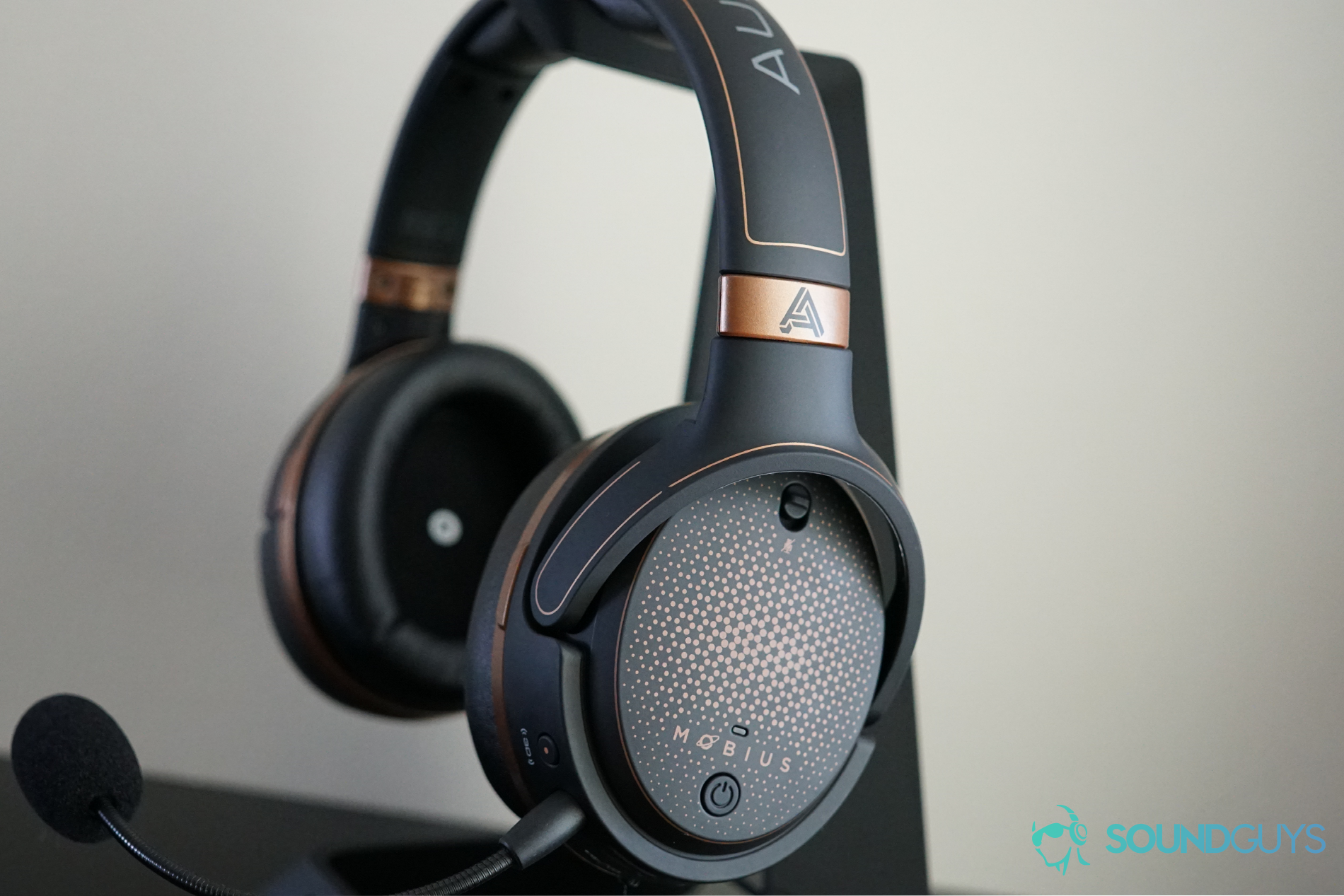
Audeze Mobius review: Now in three dimensions
Published onMarch 4, 2022
Mobius
In a landscape full of bass-boosted, LED-riddled, angular gaming headsets, what’s a person to do if they want something a little more premium? That’s where the Audeze Mobius comes in.
With almost too many features to keep track of, audio output good for more than just explosions, and all the compatibility options you could want, this is the headset for the gamer who doesn’t mind spending more to get more.
Editor’s note: This review was updated on March 4, 2022 to include a link to our feature on the SoundGuys house curve, and also a microphone score based on the results of our reader survey. Thanks for voting!
Who is the Audeze Mobius for?
The Audeze Mobius is for the gamer who wants something that does it all, and well. Whether you’re gaming, listening to music, or watching movies on a PC, laptop, or smartphone, this headset represents the premium option to meet your needs.
Out of the box
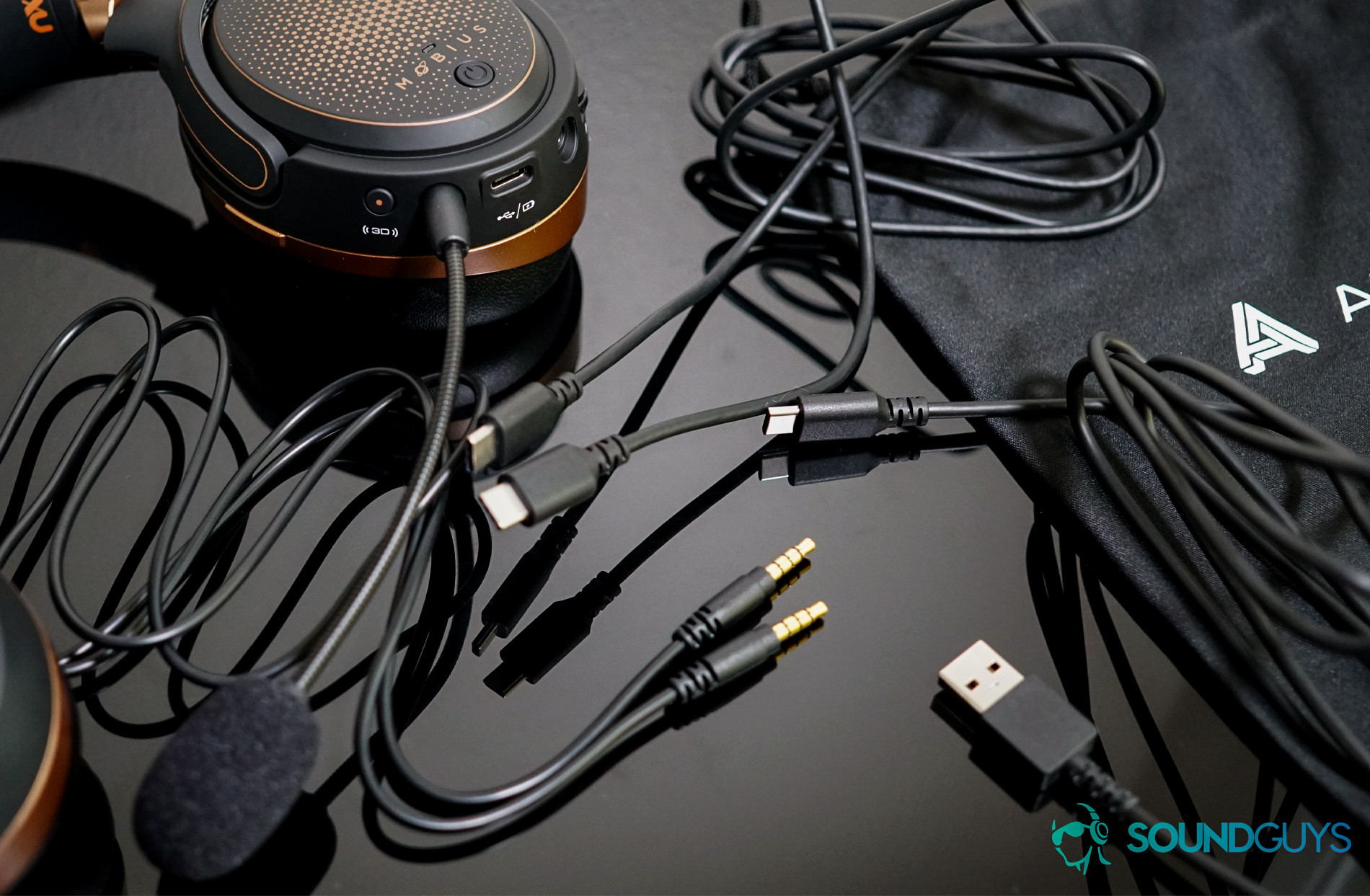
The Audeze Mobius actually comes with a lot of stuff. On top of the headset itself and its detachable 3.5mm mic, the Mobius comes with a USB-C cord, a USB-C to USB-A cord, and a 3.5mm cord. On top of that, there’s an assortment of booklets covering all the headset’s features, and a drawstring bag for carrying it.
What’s it like to use the Audeze Mobius?
The Audeze Mobius is a comfortable headset, with memory foam in the a headphone band and pads, but it doesn’t start like that. At first it was far too tight. I don’t have particularly large head, and I got noticeably sore after a little while. However, the headset just needed a little time for the memory foam to relax and fit my head. Eventually it offered a snug and comfortable fit.
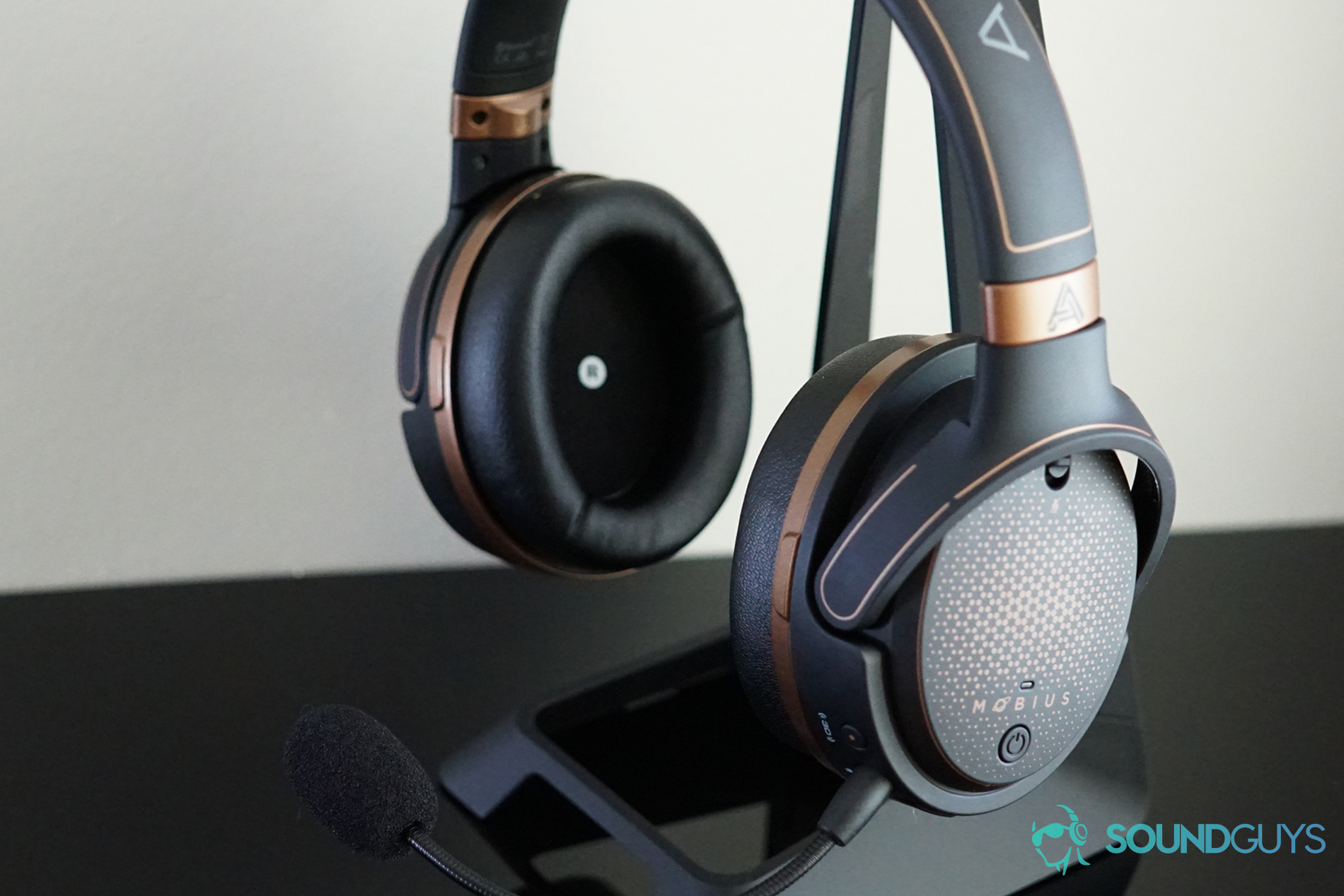
This is primarily a plastic construction, but it still feels very sturdy. The headband is made of a softer material that can bend and twist, but it’s resistant enough to retain its shape just fine. The headphones aren’t overbearingly large, unlike many high end gaming headsets, and they feel solidly constructed (as do their hinges).
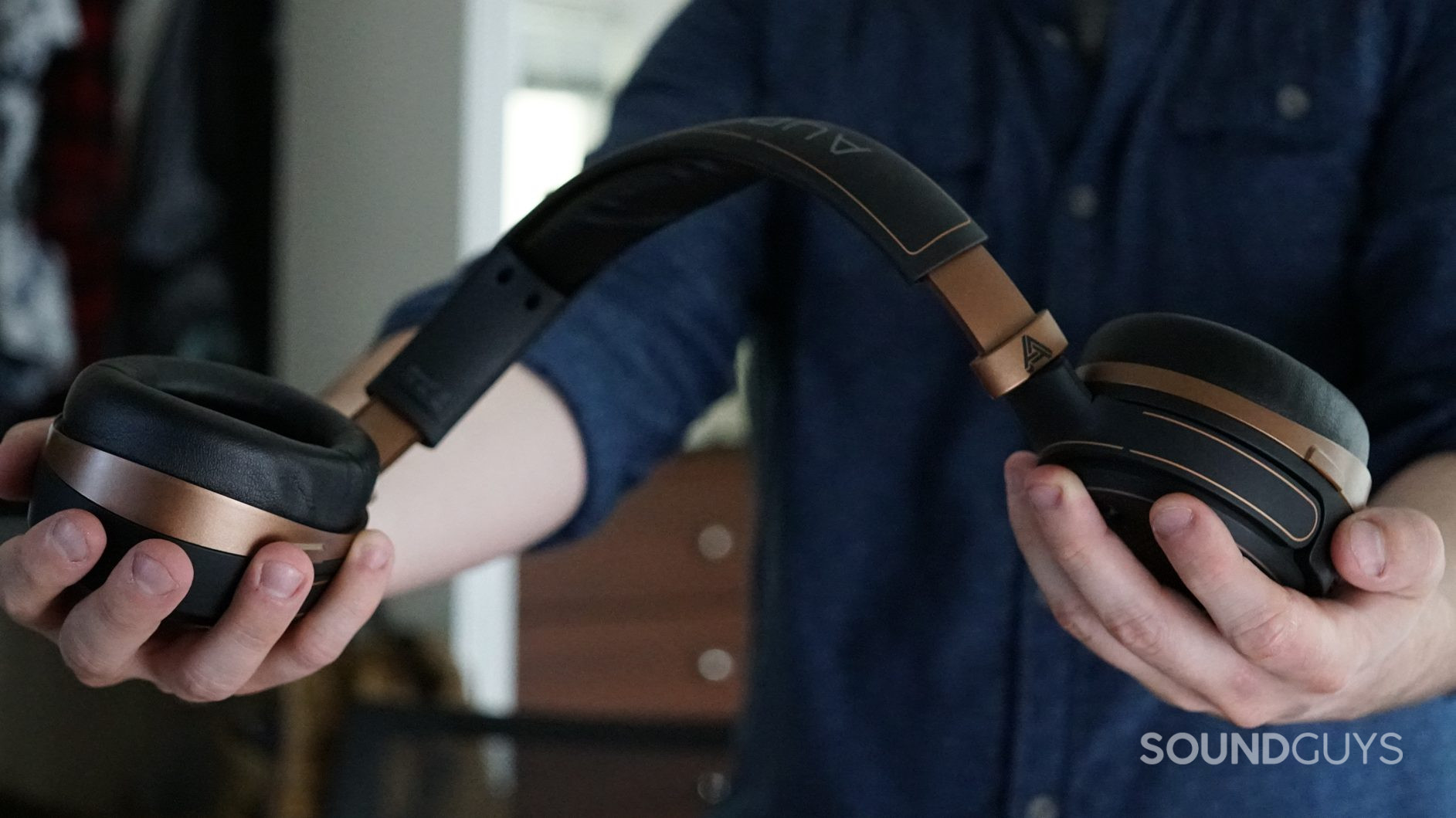
The Mobius headphone pads are covered in leatherette, and while you can get gel-filled replacement pads instead of memory foam, there’s no velour or plush option. Glasses wearers beware: you may run into some seal issues here, the initial tightness might be even more uncomfortable. Once memory foam relaxes, the pads themselves are plenty comfortable—it just takes a session or two of gaming.
The Mobius also looks more like a regular, albeit high-end, pair of headphones than most gaming headsets. People won’t look at you like a tiny UFO has docked on your head walking around with these headphones.
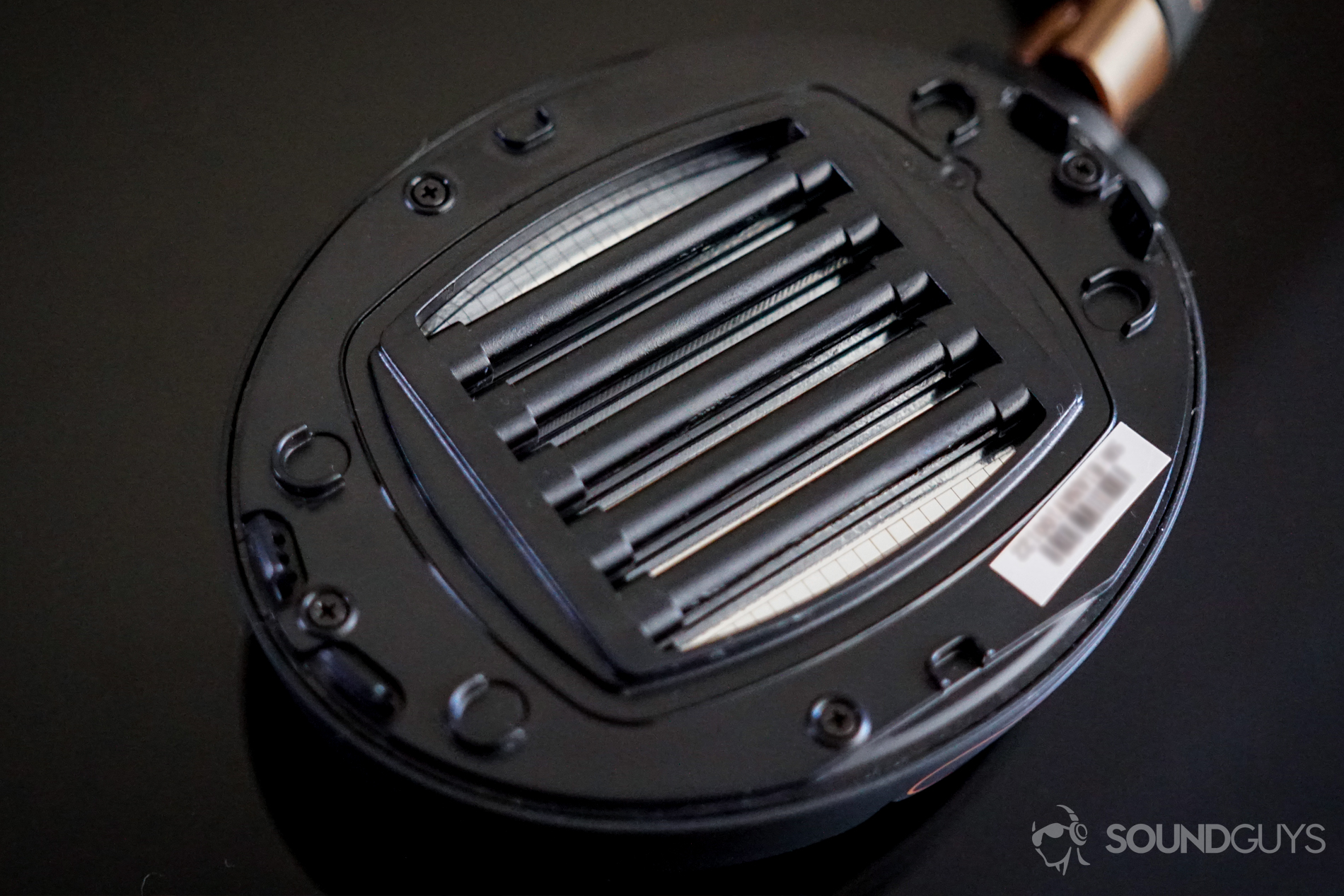
This is the first gaming headset to use planar magnetic drivers, instead of more traditional dynamic drivers. These use magnetic fields to generate sounds, and are able to reproduce sound more accurately. If you’ve never used planar magnetics before, you’re in for a treat here.
All the Audeze Mobius’ controls are on the left headphone. There are two dials for controlling headphone and mic volume. Clicking them in allows you to switch between the headset’s modes—7.1 surround sound, stereo, and bluetooth—as well as profiles like ballistics, music, flat, default, footsteps, and more. A switch on the side of the headphone will mute the mic, and another button at the bottom labeled “3D,” controls the headset’s 3D audio settings.
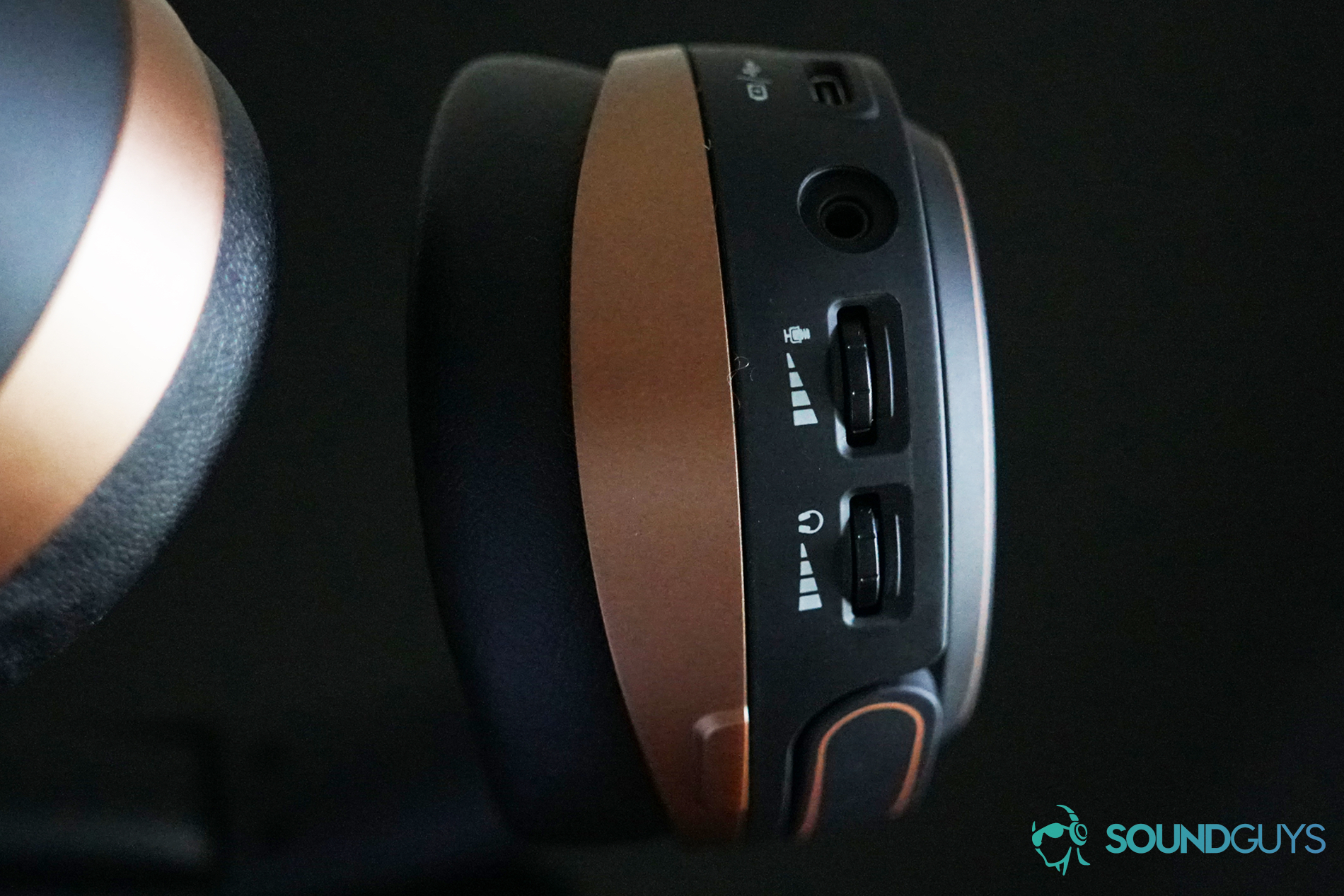
In short, there’s a lot to remember. It can be easy to forget whether you’re set on 7.1 and using the footsteps profile, using the stereo setting with the ballistics profile, or another of the many possible permutations—especially given this is all handled digitally rather than there being permanent hardware switches for each setting. Two things help with that.
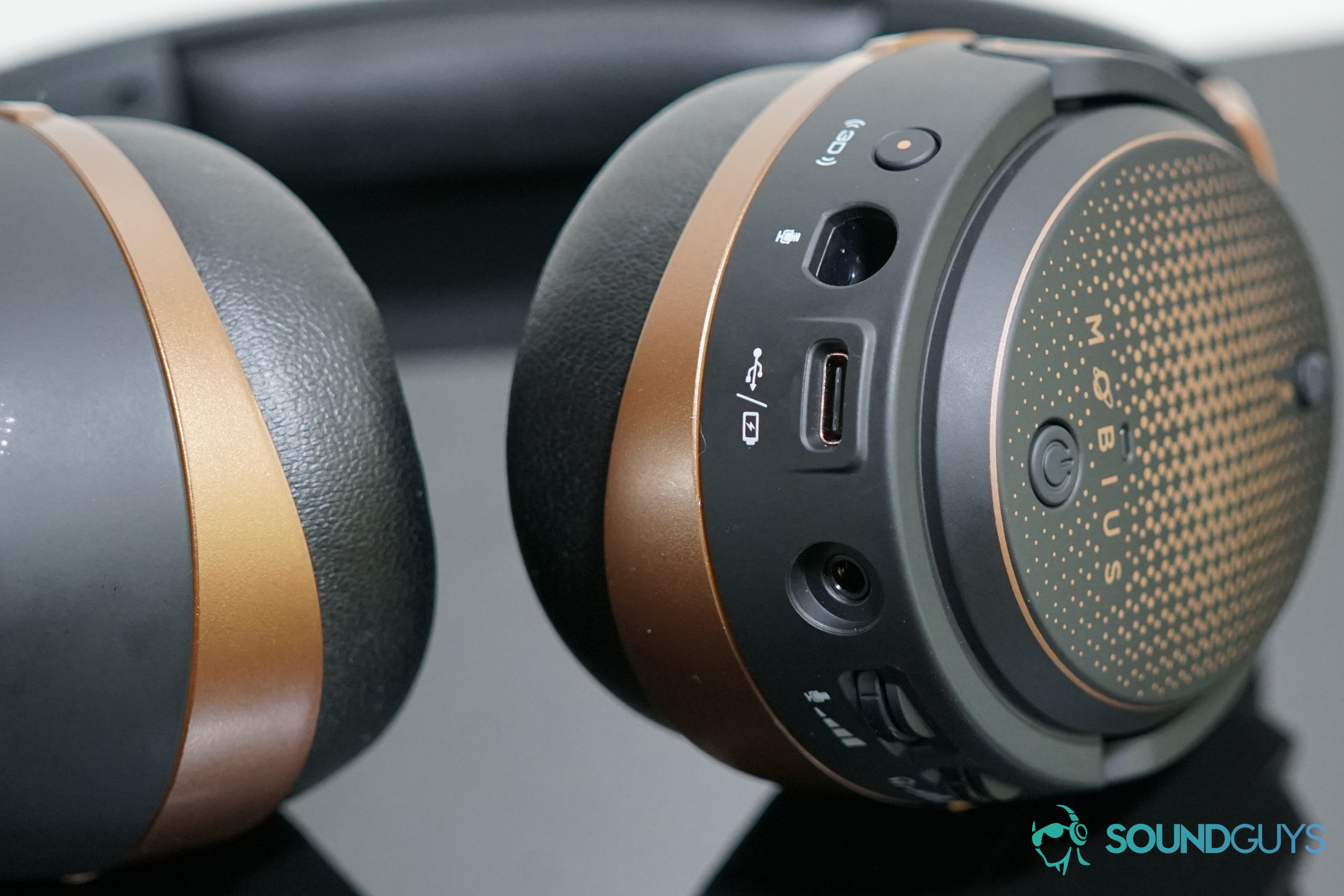
Plugging the headset into a computer via USB and you can use the Audeze HQ app to switch many of these settings through a visual interface. Additionally, the headset also announces any settings chance with a voice that plays through the headset the company calls “Gypsy Muse.”
All those options mean you can really tailor the experience to your needs. I found the different audio profiles offered pretty minimal differences, but added with all the other options, both in the headset and the app, there’s a lot of room for personalization.
How good is the 3D Audio on the Audeze Mobius?
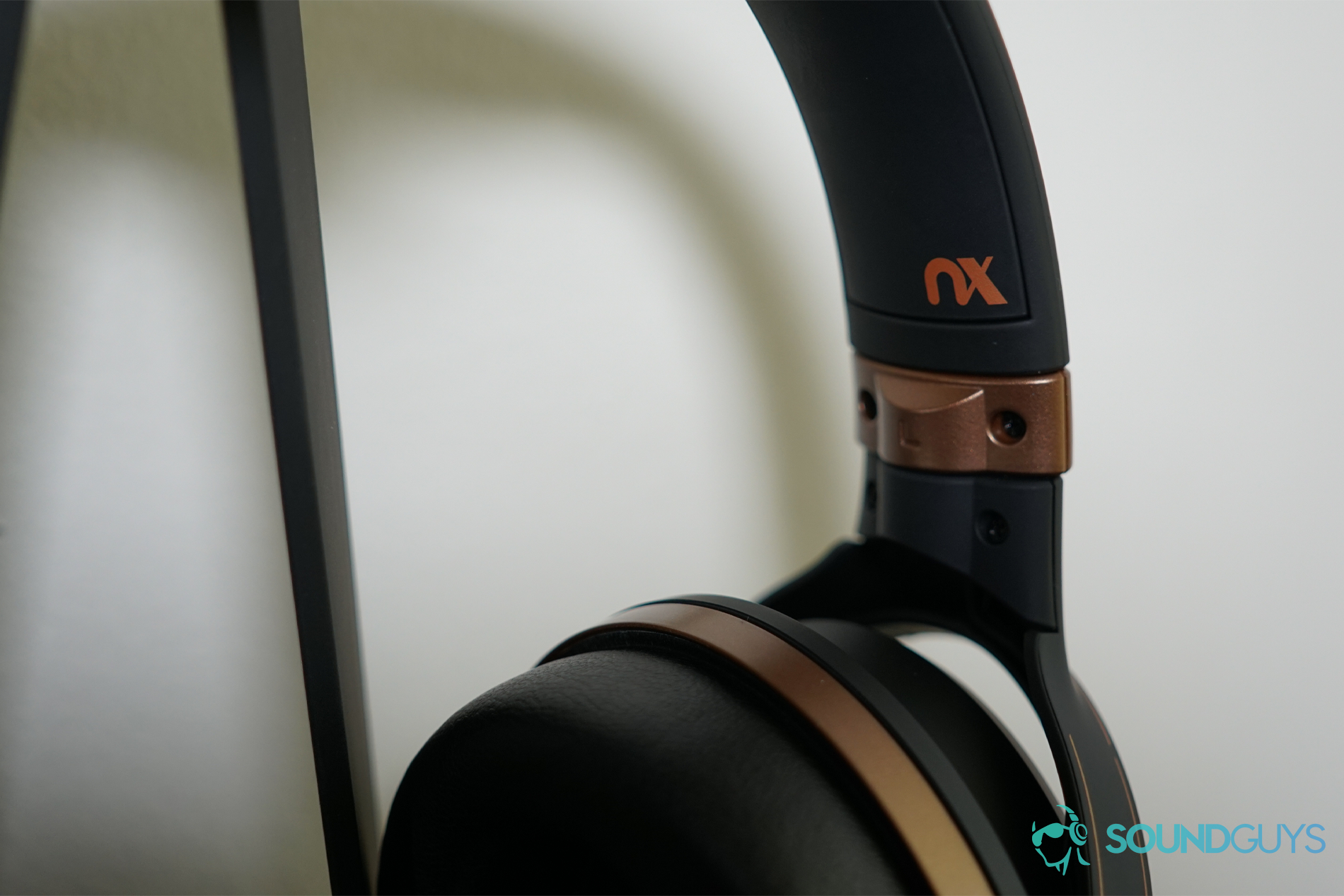
The Audeze Mobius offers 3D audio tech with Waves Nx, creating a virtual audio environment with head tracking. The feature simulates a speaker environment in the headset, and it’s fascinating. Tapping the 3D audio button on the left headphone sets a point in front of you and anchors the sound there, as if it’s coming from a pair of speakers. Turning your head makes the audio come in louder through the headphone closer to the origin point, but it doesn’t sound like the audio is shifting ears.
There seems to be some real audio wizardry going on here—it really feels like the sound is coming from a position in front of you, rather than getting blasted right from the headphones. It also means if you play some music, close your eyes, and spin around in an office chair or something like it, it feels like a band is revolving around your head. Uses like this are a little gimmicky, but they’re great fun all the same.
”when
The 3D audio options work on wired or wireless connections, but when connecting to an Android phone, you need to turn on developer options and bump up the LDAC codec settings to 990kbps to use it. It’s a bit of a to-do to set up, and as cool as it is, I’m not sure it’s worth doing. Walking around using 3D audio is rather odd, as it makes everything sound different whenever you walk in a new direction.
The feature can make media consumption pretty neat, but there’s just not much point if you’re going to have to re-center things every few steps.
Surround sound gaming with the Audeze Mobius
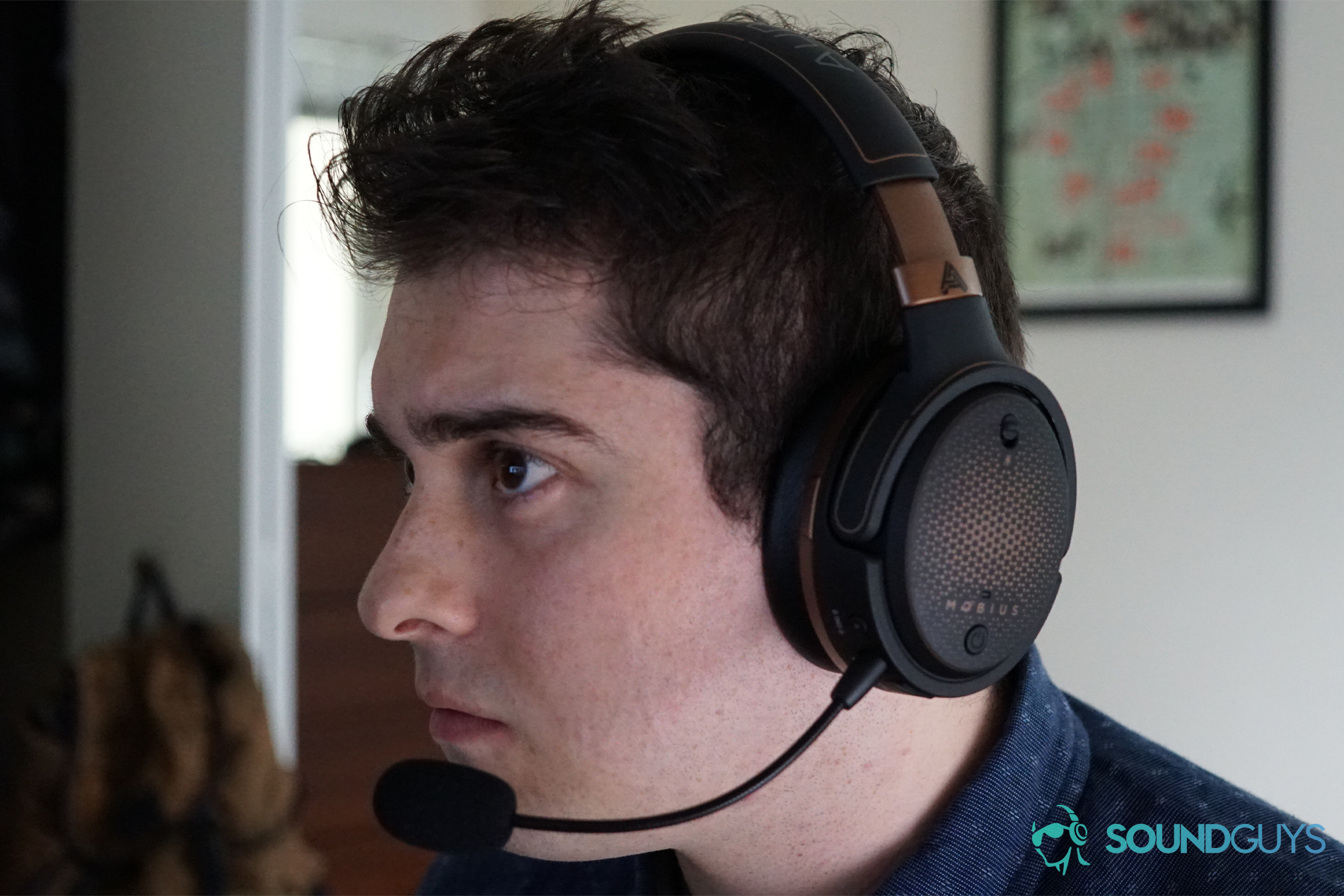
Like most gaming headsets, the Audeze Mobius supports 7.1 and 5.1 surround sound audio, allowing for a positional soundscape in games like Fortnite and Realm Royale. This is only available when plugged in via USB, but the effect is as good or better than any gaming headset I’ve used. According to Audeze, the Waves Nx head tracking makes directional audio even more accurate, and I ran into nothing that showed otherwise. It was easy to judge the direction of sounds like gunfire or the noise chests make when wandering around, as well as other audio cues in games like Assassin’s Creed: Odyssey and Overwatch.
However, it’s worth noting that while ably communicating the directions sounds are coming from can be a big help, it won’t make you magically better at a game. I suffered just as many inglorious deaths in Fortnite using this headset as with any other—I just had a better idea of where they came from.
3D room emulation works while in game, but it doesn’t have all that much of an effect. Sure, you can turn your head and the different audio cues will move around to be more accurate, but there are very few games where turning away from the screen is a good idea. This feature works really well when you’re watching movie or passively consuming content. In game it doesn’t feel all that remarkable, because the benefits aren’t as noticeable when you’re staring intently a PC monitor, actively engaging in firefights or what have you.
How is the software experience?
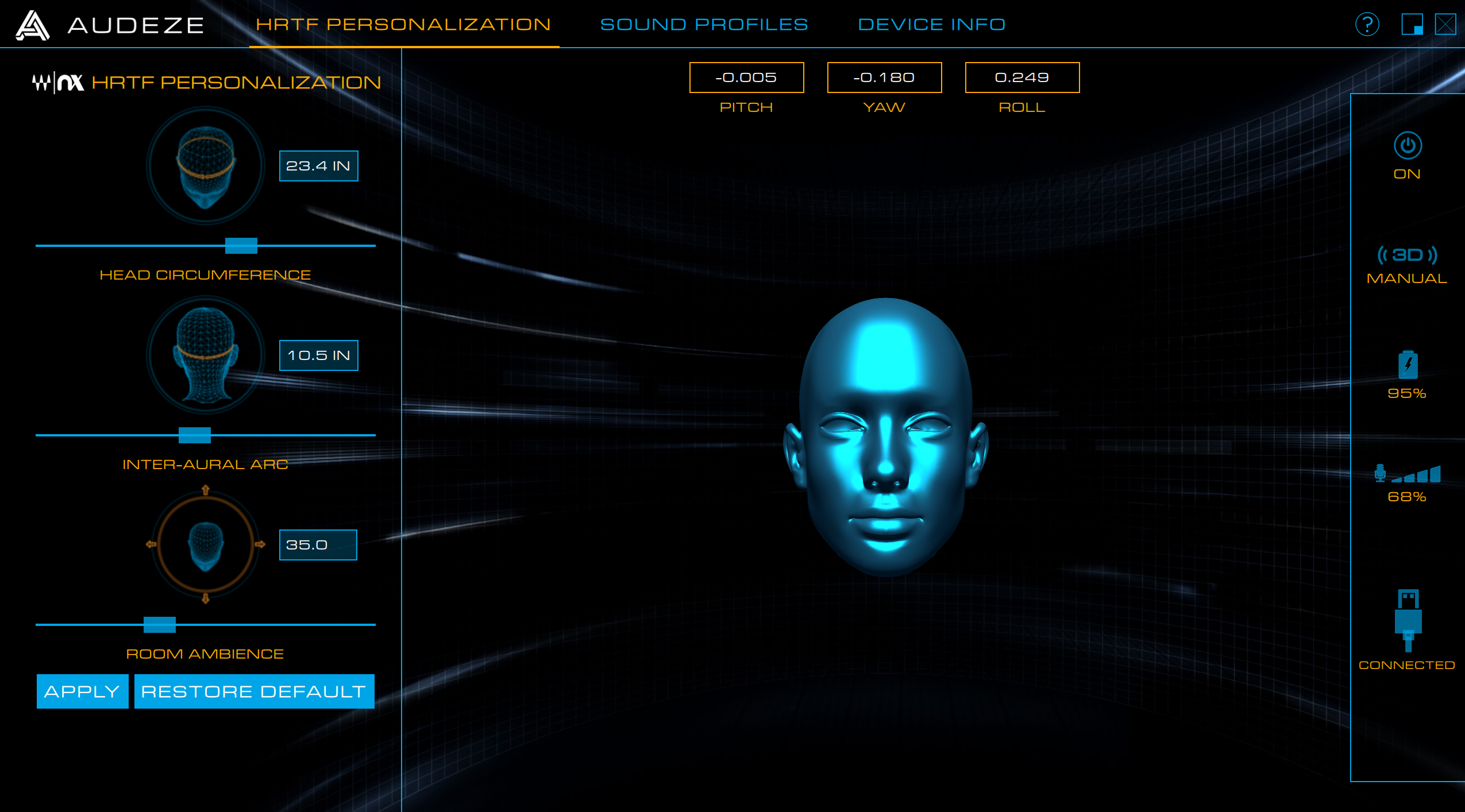
The Audeze Mobius comes equipped with a software suite built to help you keep track of your settings and change things to your liking. On top of allowing you to quickly switch between the seven available sound profiles—Flat, Foot Steps, Racing, and more—Audeze HQ lets you customize settings pertaining to the 3D audio HRTF features. Here you can use sliders to change head circumference, inter-aural arc, room ambience settings. I didn’t need to fuss much for it to sound great, but if you’re extremely particular about this stuff, the options are there to indulge.
Plus it shows a funny looking CG mannequin head that moves when you do, based on the head tracking signal coming from the headset.
How does the Audeze Mobius connect?
On top of its myriad wired connection options, the Audeze Mobius offers Bluetooth 5.0 connectivity, with support for SBC, AAC, and LDAC. For the most part, connection was rock solid regardless of what device I used. I never had any issue with dropped connections, and only ran into range issues when I walked a room at the opposite end of my apartment and closed all the doors.
There was the occasional stutter when I put it in and took it out of my pocket while connected to my Pixel 3, but it hardly interrupted anything.
How long does the Audeze Mobius’ battery last?
According to Audeze, the Mobius should last around 10 hours on a single charge. In our testing it lasted around nine hours and 4 minutes, but we test at a higher volume (~75dB) than most people typically listen, so you might get a bit more mileage.
How does the Audeze Mobius sound?
The Audeze Mobius offers best-in-class audio for a gaming headset. With multiple output modes and audio profiles to choose from, these headphones can basically do it all. Though they’re quite expensive, this is one of those times where spending the extra is absolutely worth every penny, even if it’s for nothing but the audio quality.
Loading chart ...
In the stereo mode, which also uses Waves Nx, Audeze Mobius accurately outputs audio across the audible spectrum. There are some dips here and there, but overall bass, mids, and highs all come through very clearly. I think it sounds great. This is definitely where the planar magnetic drivers really shine. The sound has very little distortion and everything comes through extremely clearly and distinctly. The headset’s frequency response curve keeps remarkably close to our house curve too (ours is the pink line).
In Boom Swagger Boom, by The Murder City Devils, lesser headsets would risk of losing a lot of sounds in the heavy reverb on the guitar and the lead vocals, but everything from the backup vocals to the subtler bass line tying everything together comes through clearly. It really sounds great.
Lesser headsets would risk of losing a lot of sounds in the heavy reverb on the guitar and the lead vocals
The 7.1 mode presents a slightly different profile to the Stereo mode, and one very different to the typical gaming headset. Most gaming headsets boost bass to occasionally nauseating degrees, all in an effort to make those explosions really, ah, go boom, I guess? That’s all well and good if you’re aiming for an immersive (and loud) audio experience, but not so hot if you rely on audio cues like foot steps or the faint shimmery sound of a chest in a game like Fortnite (you know the one).
The Audeze Mobius doesn’t fall into that trap, offering a small bump to bass, and slightly boosting mids too. In game this translated to it being noticeably easier pick out sounds like footsteps in heated moments than with other gaming headsets.
Loading chart ...
The Audeze Mobius handles isolation about as well as any other gaming headset out there. It will block out most of the noises associated with gaming at home, like roommates or family watching TV, or random traffic noises out the window.
These headphones will work just fine out and about, too. They won’t do much to keep out the rumbles of traffic you’ll run into out and about, but plenty of that you’ll probably want to hear.
How is the microphone?
The Mobius’ microphone handles the range of sound voices typically occupy very well, boosting mids and highs, while accurately outputting bass. You really shouldn’t run into any issues with call quality on this end—just have a listen:
How does the microphone sound to you?
Should you buy the Audeze Mobius?
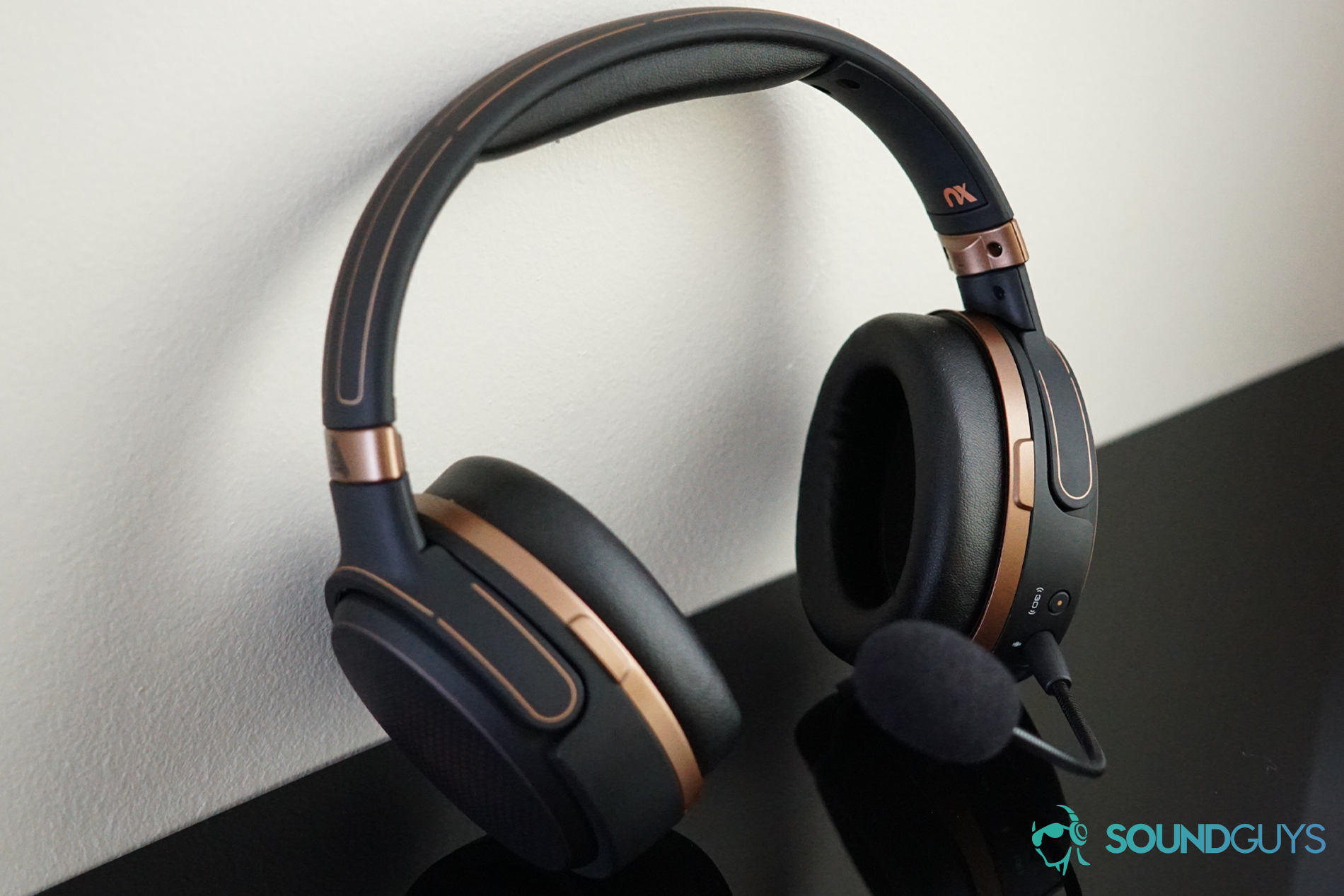
The Audeze Mobius one of the best gaming headsets you can buy—end of story. It offers a premium feature set, best-in-class audio, and a comfortable fit. It’s also really expensive at a hair under $400. It’s worth it if you want a great headset for all uses, but if you’ve already got everyday headphones you like, pretty much every option is cheaper.
Wireless gaming headsets the Corsair Virtuoso Wireless SE sounds almost as accurate, has just as good a microphone—if not better—it works wirelessly for gaming, and it’s almost $100 USD cheaper. The Razer BlackShark V2 was one of the best gaming headsets of 2020, and it costs a quarter what Audeze Mobius does; even it’s more expensive wireless version is still more than $200 USD cheaper. Same goes for headsets like the Logitech G Pro X and G Pro X Wireless. None of these headsets support as sophisticated a surround sound system as Waves Nx, but they all offer virtual surround sound that works well enough.
In all fairness, the head tracking through Waves Nx offers a noticeably more accurate experience of surround sound gaming. Additionally, while the room emulation may not bring a lot to gaming, it offers a fascinating and immersive experience watching movies and listening to music. Even here though, you don’t need to spend this much to gain access. The HyperX Cloud Orbit S is essentially the same headset as the Audeze Mobius, only without the Bluetooth support, and it features full support for Waves Nx—it’s also almost $100 USD cheaper. If you don’t care about the Waves Nx experience, the Audeze Penrose might also be a better fit—it’s wireless and sounds just as good as the other two.
However, all these alternative recommendations come with trade-offs. If gaming audio with all the bells and whistles you could want is what you’re after, look no further.
Frequently asked questions
No. The head tracking only functions with the WavesNx, and generally it’s just meant to keep audio cues coming from the right direction. There aren’t any game-specific integration options.
On newer platforms, the headset will only support the built-in surround sound of a given console. Both the Xbox Series X and PlayStation 5 offert spatial audio, which expands on a regular virtual 7.1 setup by including vertical sound as well (above and below you).
No.
The Audeze Mobius is definitely a gaming-first headset, but it’s raw audio performance and head tracking make it great for media consumption too. This could work very well for a more general-use pair of headphones, but its battery life is pretty lackluster, and though it supports the LDAC codec, more common high-end options like AAC and aptX are missing. It’s also fairly heavy. It could work, but you might be better served elsewhere.
The full Waves Nx 3D audio experience only works on PC. You can still use the head tracking to mimic a speaker experience on console, but surround sound isn’t an option.
Plugging the Audeze Mobius into a receiver will work fine enough over 3.5mm, USB-A, or USB-C (provided you receiver supports those connection methods), but you won’t be able to use software features the Waves Nx 3D audio. Basically, it’ll just function as a decent pair of wired headphones.